- Details
AFAM: Hello Charles and thank you for agreeing to be our interviewee.
Charles: Hello Albina. It is a pleasure to answer your questions today.
AFAM: you are an Aerospace Engineer (PhD) with professional experience in computational fluid dynamics, flow control, and advanced data analysis. You are also an Assistant Professor (research) at the University of Cincinnati. Please tell us a few words about this role.
Charles: My PhD research was focused on CFD applied to a breadth of industrial flow challenges, during which I worked with different research groups, including the laryngeal biomechanics lab at UC. I joined this lab for my postdoctoral appointment, and after a few years, I obtained my own grant funded by the NIH (National Institutes of Health). This is a research track which means that my funding comes from my grants and the Otolaryngology department, and I can focus 100% on my research (no teaching required). I can still be a thesis advisor for master's PhD students, which are always involved in our grants.
AFAM: How come you decided to work in research?
Charles: While finishing my master’s degree at Arts & Métiers in 2010, I did a 6-month internship in the Gas Dynamics and Propulsion Lab at UC, where I discovered what scientific research was. It was quite different from anything I imagined before, given the lack of exposure I had during my previous studies. I appreciated the interaction between academia and industry, where my lab mates and I developed innovative technologies using advanced measurement techniques. It made me realize that academic research in the US was funded completely differently than in Europe, which allowed for more interesting projects in university labs.
This is partly why I decided to go for a PhD, and later continue to work in a research lab with which I collaborated while doing my doctoral research.
AFAM: your latest research project is about providing insights into the optimal technique for treating unilateral vocal fold paralysis. Please tell us more about this project and why it is important?
Charles: Patients with unilateral vocal fold paralysis complain of a soft, breathy voice that is difficult to understand in noisy environments. From a physical standpoint, a breathy voice (imagine a whisper) means that the energy conversion of the lung air pressure to acoustics is inefficient. We collaborate with surgeons who perform the different variants of the thyroplasty type 1 on excised larynges and measure the efficiency pre- and post-surgery. While the outcome of these surgeries varies for each patient and success depends on multiple factors, by analyzing a sufficiently large sample, we can provide physicians with general guidelines to achieve favorable outcomes.
AFAM: you have been living in the US since 2010. How do you like the United States? How was your professional experience in the US so far? How is it different from other countries where you were living and working (France and Switzerland)?
Charles: I love living in the US! This country is very spacious, and it feels like it (unless you live in Manhattan maybe). Whether it is to find a place to live, to work, to discover, etc… Professionally, I feel like I have a lot of opportunities to grow here and create my own path in my field of research.
Nevertheless, in 2010, as an intern, I didn’t think I would stay for more than 6 months. Then I became a (paid) doctoral student, before finally getting a “real” fulltime job, in which I evolved until now. So, I can say I experienced a lot of different facets of what it means to work in the US. I was never a full time employee in France (mostly worked summer jobs in construction companies), and I only worked for 3-months in Switzerland (internship), so I can’t really speak from experience when it comes to comparing the experiences.
AFAM: How has being a Gadz'Arts graduate helped you in your career?
Charles: What helped me the most was the community that I found thanks to the school alumni network. I found this internship in 2010 via Dr. Drouin, who was my fluid mechanics professor in Paris. Then when I landed in the US, I didn’t know anybody, and a former A&M student helped me get settled and meet locals. I did my best to return the favor and do the same for the interns who joined the lab from A&M year after year following me. As a faculty I was found by a Gadz’Arette last year and she joined my lab for 9 months, doing an amazing job for my grant. I attribute these interactions, encounters, and experiences to my Gadz'Arts background.
AFAM: We know a lot about your professional experience, could you please tell us a few words about your hobbies or what you like to do in your free time?
Charles: I came to the US in 2010 as it represented for me the mecca of skateboarding, then discovered wakeboarding and later golfing, now running, and more. I love traveling with my wife, and also hosting family at home when they dare to cross the ocean.
AFAM: today AFAM offers a Sequoia program to students and alumni willing to study in the US. Any pieces of advice you want to give to those who would like to study in the United States?
Charles: Do it! I know the admission and immigration processes are tedious, but it is 100% worth it. Studying abroad, meeting diverse cultures through the tons of international students, speaking languages, traveling, etc… are so important to one’s development.
AFAM: thank you very much, Charles.
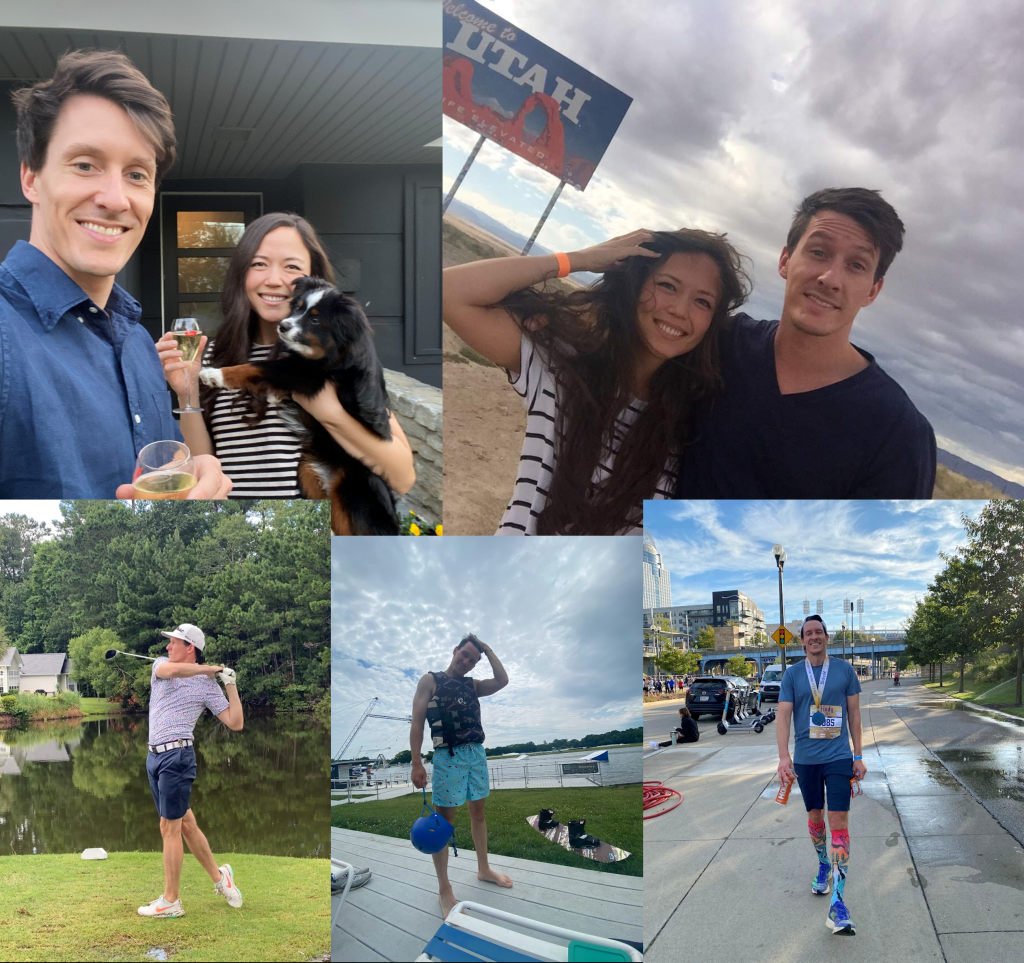
Photos courtesy of Charles
About Charles’ latest project:
https://link.springer.com/article/10.1007/s00405-024-08519-x
Please join our Sequoia program if you want to study in the United States
- Details
On March 27th, AFAM organized an online event to present its Sequoia program. This event was organized in partnership and on the platform of Pôle Carrière.
Sequoia committee members - Nicolas Horde (Ai 214), zident of the West Coast group, Valentin Fehr ( Cl 212), Atlanta group representative and Albina Patou-Chebykina, AFAM community manager, talked to students and alumni about the program Sequoia which helps gadz'arts prepare admissions to American Universities.
Participants got some time at the end of the event to ask their questions.
We will be happy to accept students and alumni to our new Sequoia program. You just need to
To know more about the Sequoia program, please visit our website
Thank you, to Pôle Carrière and in particular to Frédéric Beck and Julienne Nadin for helping organize this conference.
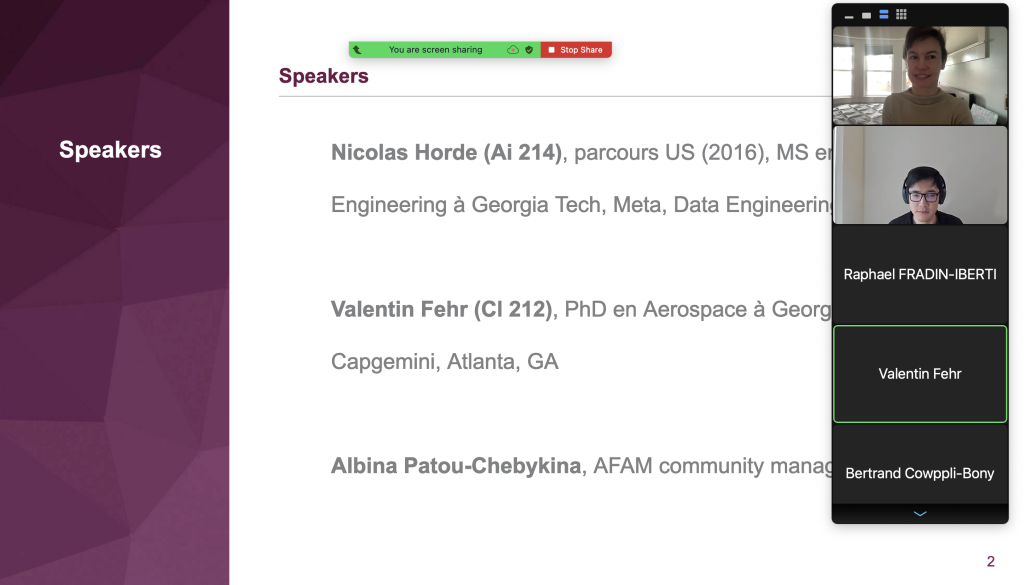
- Details
For the first time in 2024 French American Chamber of Commerce organized an event in San Jose and not in San Francisco which is often the case. The San Jose location attracted many French speaking people living in the South Bay. The event took place on the last day of February -29th.
A lot of French speaking engineers, entrepreneurs, managers, consultants, teachers and other professionals attended the networking spring event to meet new people and make new connections.
Some gadz'arts were also seen among the audience.
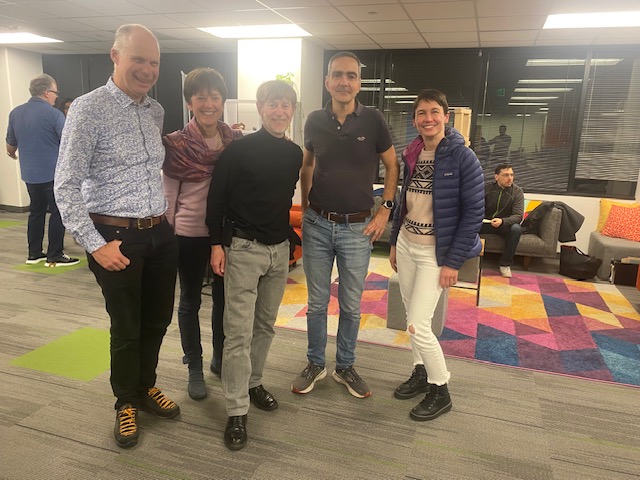
On the picture (from left to right): Xavier Wartelle (AFAM CEO), Jean Pommier (AFAM CFO ) with his wife Agnès, Vincent Durieux and AFAM community manager Albina at the event
- Details
NYC-based gadz group gathering took place in February. On Thursday, February 15th, a group of gadz'arts led by Sasha Ghebali, West Coast Zident, gathered for Happy Hour in one of NYC bars.
It looks like they enjoyed being together.
Thank you, Sacha, for sharing this picture below with AFAM.
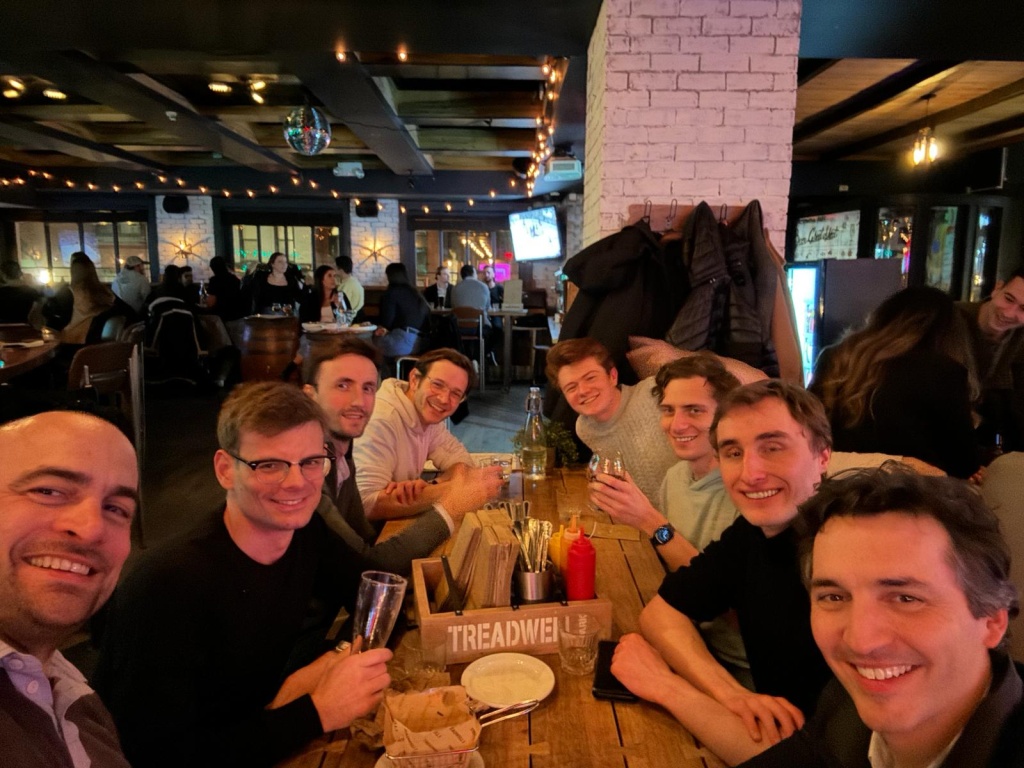
- Details
On February 6th, AFAM representatives - AFAM CFO Jean Pommier (An 183), Robert Stelly (Ch 197), member of Shasta committee and Valentin Fehr (Cl 212), member of Sequoia committee, AFAM board member, as well as Albina Patou-Chebykina, AFAM community manager, - met with Daniela Stelmaszyk, Head of European and International Mobility, and two Rinters (stands for "relations internationales").
Cathérine Epis, from the Châlons campus team, also attended the meeting.
Rinters Amir Azzouz (Li 2022) and Elliot Nendick (Me 2022), in charge of international relations on Lille and Metz campuses, met AFAM volunteers and AFAM community manager to learn about our Shasta, Sequoia and Yosemite programs and ask questions about AFAM and its activities.
AFAM would like to thank Daniela Stelmaszyk for organizing the meeting.
We hope that Amir and Elliot as well as other Rinters on Aix, Paris, Cluny and other campuses will become our partners to facilitate communication with our students.
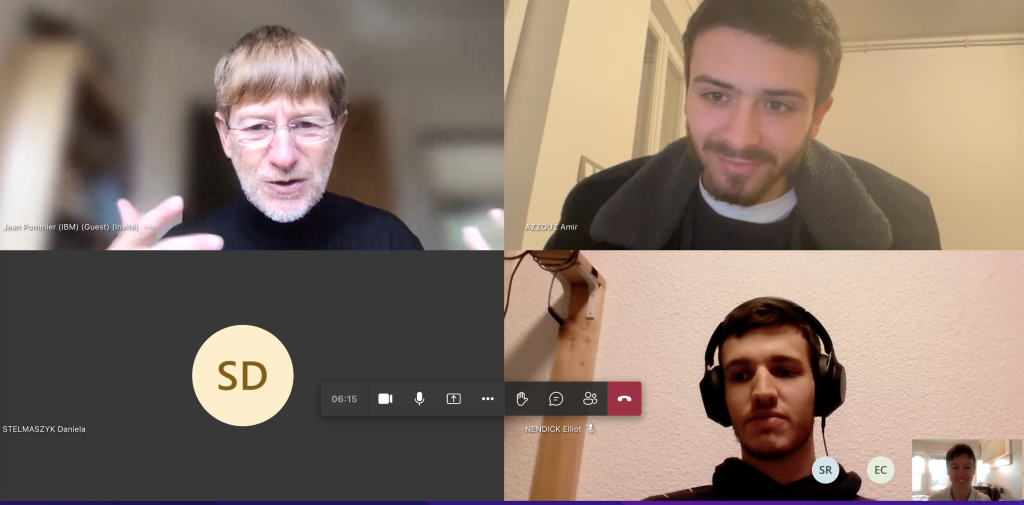
Additional information about AFAM and its programs:
If you are looking for an internships in the US to start in September 2024, please contact us to join the Shasta program
If you are willing to study in the US, please join our Sequoia program
- Galette des rois organized in French Consulate in Houston
- Traditional Galette des Rois took place in Saratoga
- Looking back at 2023!
- Zoom on: interview with Bailey Sizemore, a Mechanical Engineering Senior at Texas A&M University.
- Last 2023 AFAM conference took place on December 15th during the International Week

 BLOG /
BLOG /  CALENDAR /
CALENDAR /  DONATIONS /
DONATIONS /  MENTORS /
MENTORS /